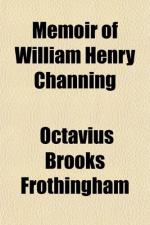|
This section contains 364 words (approx. 2 pages at 300 words per page) |
Dictionary of Literary Biography on William Henry Channing
William Henry Channing (25 May 1810-23 December 1884), Unitarian minister and social reformer, was born into a well-to-do Boston family. His uncle, the Reverend William Ellery Channing, became a strong influence on young William, who went to the Boston Latin School before entering Harvard College in 1825. By his graduation in 1829, he was familiar with many of the people who would become known as Transcendentalists. Channing attended the Harvard Divinity School from 1830 to 1833, then became an itinerant preacher, eventually being ordained and settling at Cincinnati in 1835. The next year Channing sailed for Europe and on his return, married and took a ministry among New York's poor. But he resigned a year later, went to Boston, and then returned to Cincinnati in 1839. He was editor of the liberal Unitarian journal, the Western Messenger, until its collapse in 1841, when he again moved to New England. There he translated Jouffroy's Introduction to Ethics (Boston: Hilliard, Gray, 1841) for George Ripley's Specimens of Foreign Standard Literature series and contributed to the Transcendentalists' periodical, the Dial. Over the next decade and a half Channing was active in every major reform movement as he held posts in Boston, New York, and Rochester. Through his journals, the Present (1841-1843) and the Spirit of the Age (1848-1850), he supported anti-slavery, peace, temperance, and woman's rights, and he became personally involved in associationism or socialism as practiced in the Brook Farm and North American Phalanx communities. Channing also memorialized two of his friends in Memoir of William Ellery Channing (Boston: Crosby & Nichols, 1848) and, with the help of Ralph Waldo Emerson and James Freeman Clarke, Memoirs of Margaret Fuller Ossoli (Boston: Phillips, Sampson, 1852). In 1857 he was honored by replacing England's most influential liberal Unitarian preacher, James Martineau, at Liverpool. Channing remained in England for most of his life, dying in London, although he returned to America during the Civil War, serving as a pastor in Washington, D.C., and as chaplain of the United States Senate, and occasionally thereafter to give lectures, including the prestigious Lowell Lectures in Boston in 1869. A life-long reformer and champion of the average man, Channing was commemorated in Emerson's "Ode. Inscribed to W. H. Channing" as "The evil time's sole patriot."
|
This section contains 364 words (approx. 2 pages at 300 words per page) |


